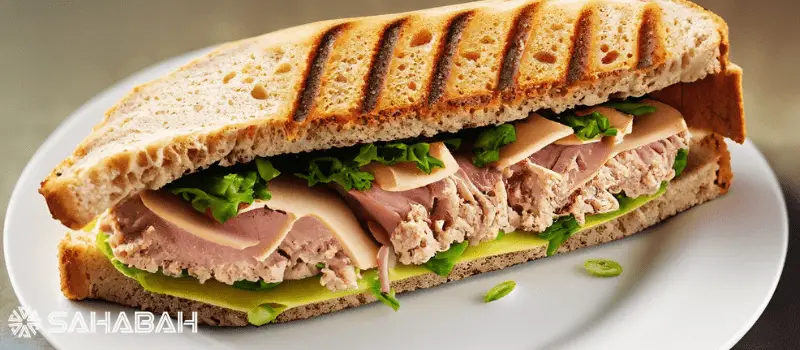As a practicing Muslim, I have always been conscious of the halal status of the food I consume. In this article, we will delve into the intriguing question of whether tuna fish is halal or haram in Islam, shedding light on the various perspectives and considerations surrounding this topic.
Is Tuna Fish Halal or Haram in Islam
Definition of halal and haram in Islam
In Islam, foods and drinks are classified as either halal (permissible) or haram (prohibited). Halal foods are those that adhere to Islamic dietary guidelines as specified in the Quran and hadiths. On the other hand, haram foods refer to those that are forbidden for Muslims to consume.
Some key principles that determine a food’s halal status include:
- Meat must come from animals that are slaughtered according to Islamic rites
- Pork and its byproducts are haram
- Alcohol is prohibited
- Foods containing blood are haram
Consumption of haram foods is considered a sin in Islam. As the Quran states:
“O mankind! Eat of that which is lawful and wholesome, and follow not the footsteps of the devil. Lo! he is an open enemy for you.” (Quran 2:168)
Importance of determining if foods are halal
For observant Muslims, adhering to a halal diet is an important part of practicing their faith. Consuming halal foods and avoiding haram ingredients allows them to live in accordance with Quranic teachings.
Determining a food’s halal status is especially significant when it comes to meat and animal byproducts. As discussed in Are Seafood Halal?, seafood like fish and shellfish have specific guidelines that must be followed for them to be permissible.
Overview of tuna’s halal status
Tuna is one of the most commonly consumed types of fish. But does it meet the requirements for a halal diet? In this article, we will analyze the evidence regarding tuna’s halal status in Islam.
Background on Tuna
Tuna refers to several species of large, predatory fish that are commonly consumed around the world. Here are some key facts about these popular saltwater fish:
Different types of tuna
There are over 15 species of tuna, but 5 main types are commonly fished and sold commercially:
- Albacore tuna
- Yellowfin tuna
- Bigeye tuna
- Bluefin tuna
- Skipjack tuna
Skipjack makes up the majority of canned tuna, while the other varieties are more often sold fresh or frozen.
Methods of catching tuna
The two main methods used for catching tuna are:
- Pole and line – Individual tuna are caught manually one at a time using fishing poles and bait. This selective method avoids unintended catches.
- Purse seine nets – Large nets are used to encircle entire schools of tuna. However, other species can get accidentally caught as bycatch.
Processing of canned tuna
After catching, tuna undergoes the following steps to be canned:
- Heading, gutting and cleaning
- Cooking at high heat to denature proteins
- Removing bones, skin and dark flesh
- Mixing with broths, oils or other additives
- Packaging into sealed cans
The main consideration is whether any non-halal ingredients are added during canning.
Overall, the factors that determine tuna’s halal status have to do with how it is caught and processed. Next we will analyze the evidence regarding its permissibility in Islam.
Evidence That Tuna Is Halal To Eat
There are several reasons why tuna is generally considered to be halal:
Tuna is a fish that is permissible to eat in Islam
-
According to the Quran and hadiths, all seafood is halal for Muslims to consume as long as it is caught and processed properly.
-
Tuna are marine fish, not land animals, so they do not fall under the same restrictions as pork and other haram meats.
Most tuna species eat plankton, algae and other plant matter making them halal
-
Albacore, yellowfin, bigeye and bluefin tuna all primarily eat zooplankton, phytoplankton and small fish.
-
Their diets do not consist of significant amounts of insects, meat or other haram sources that would render them impermissible.
Tuna caught via pole and line method are halal
-
Pole and line tuna fishing avoids accidental catches of haram species.
-
The fish are also retrieved from the water while alive, which complies with halal slaughter guidelines.
No haram ingredients added during canning process
-
Major tuna brands do not add any non-halal ingredients like pork products when canning tuna.
-
As long as the tuna itself is halal, the canning process to package and sell it does not affect its permissibility.
So in summary, tuna’s nature as a permissible seafood, its primarily halal diet, and lack of haram additives make it generally acceptable for Muslims to eat.
Potential Issues With Halal Status
While tuna is generally considered halal, there are some potential issues to be aware of:
Use of nets to catch tuna could lead to accidental catch of haram species
-
Purse seine nets used to catch large schools of tuna could also trap non-halal fish like eel, shark, or squid.
-
However, this rarely occurs in practice and does not render the tuna itself haram.
Pre-stunning of tuna before slaughter in some regions
-
In some parts of the world, tuna are pre-stunned before slaughter, which would invalidate halal guidelines.
-
However, this is not a common practice for most commercial tuna fishing.
Processing in facilities that also handle pork products
-
Some tuna canning facilities also process pork, which introduces a risk of cross-contamination.
-
Checking for halal certification can help avoid tuna canned in non-halal plants.
Overall, these issues do not automatically make tuna haram, but Muslims who want to avoid any doubt should verify the sourcing and handling methods.
Obtaining Halal Certification
For Muslims who want absolute confirmation of tuna’s halal status, looking for proper certification is recommended:
Purpose of halal certification for tuna products
-
Halal certification verifies the entire supply chain – catching, slaughtering, processing, handling, etc.
-
It provides assurance that established halal criteria have been fulfilled.
What halal certification entails for tuna
Certification involves:
-
Audits of fishing vessels, processing plants, canneries to inspect ingredients, sanitation, processes
-
Review of procurement records to confirm no haram species were caught
-
Testing finished products for any contamination
Major tuna brands that have obtained certification
-
According to Halal Certification of Canned Tuna, brands like Ayam Brand, Century Pacific Food, and Unison have halal-certified tuna.
-
Looking for the halal logo on canned tuna is an easy way to verify its permissibility.
So for full validation, checking for proper halal certification of tuna products can remove any doubts.
Frequently Asked Questions: Is Tuna Halal
Yes, tuna is considered halal for consumption. According to Islamic dietary laws, all fish are generally considered halal, including tuna.
Is tuna haram in Islam?
No, tuna is not considered haram (forbidden) in Islam. Tuna is a type of fish, and Islam permits the consumption of all fish, making tuna permissible for Muslims to eat.
Is canned tuna fish halal?
Yes, canned tuna is halal as long as it does not contain any haram (forbidden) ingredients. Most commercially available canned tuna products are halal, but it is always recommended to check for halal certification or refer to trusted sources for confirmation.
Is tuna halal or haram in Islam?
Tuna is halal in Islam. All types of fish, including tuna, are considered halal unless they are specifically mentioned as haram in the Quran or hadith.
Does tuna have to be a scaled fish to be halal?
No, tuna does not have to be a scaled fish to be halal. While it is preferred to consume fish with scales, there is an opinion within Islamic jurisprudence that allows the consumption of fish without scales, including tuna.
Can Muslims eat tuna?
Yes, Muslims can eat tuna as it is considered halal. Tuna is a popular choice for many Muslims and is widely consumed around the world.
Is it permissible to eat raw tuna?
Raw tuna, such as in sushi or sashimi, is permissible for consumption in Islam. However, it is important to ensure that the raw tuna is sourced from a trusted supplier and handled in a hygienic manner.
Is it halal to eat skipjack tuna?
Yes, skipjack tuna is halal for consumption. Skipjack tuna is a type of tuna fish, and all tuna varieties are generally considered halal in Islamic dietary laws.
What is the halal status of Subway tuna?
The halal status of Subway tuna may vary depending on the location and the specific supplier they source their tuna from. It is advisable to contact your local Subway restaurant or check their official website for information on halal certification and the source of their tuna.
Is yellowfin tuna halal?
Yes, yellowfin tuna is halal to eat
Conclusion
In summary, the evidence points to tuna being permissible for Muslims to eat:
Summary of evidence that tuna is generally considered halal
- Tuna is classified as a halal seafood according to Islamic law
- Most tuna species consume plants and plankton, not other fish or meat
- Tuna caught via pole and line meet halal slaughter requirements
- No haram ingredients added when tuna is canned
Need for Muslim consumers to check certification status if concerned
- Issues like stunning or facility contamination are rare, but possible
- Muslims who want absolute certainty should look for halal certification
- Major tuna brands like Ayam and Century Pacific have halal-certified products
Caution recommended if halal status is questionable
- When in doubt, it is better for Muslims to avoid tuna not confirmed to be halal
- Asking retailers and manufacturers for details can help determine permissibility
- If tuna’s catching, handling or processing is unclear, caution should be taken
In conclusion, while most tuna is halal, observant Muslims should verify its permissibility if any doubts exist.





